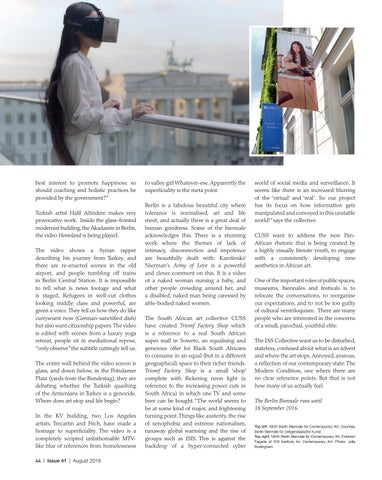Discover Germany | Feature | Berlin Biennale
best interest to promote happiness; so should coaching and holistic practices be provided by the government?” Turkish artist Halil Altindere makes very provocative work. Inside the glass-fronted modernist building, the Akadamie in Berlin, the video Homeland is being played. The video shows a Syrian rapper describing his journey from Turkey, and there are re-enacted scenes in the old airport, and people tumbling off trains in Berlin Central Station. It is impossible to tell what is news footage and what is staged. Refugees in well-cut clothes looking middle class and powerful, are given a voice. They tell us how they do like currywurst now (German-sanctified dish) but also want citizenship papers. The video is edited with scenes from a luxury yoga retreat, people sit in mediational repose, “only observe”the subtitle cuttingly tell us. The entire wall behind the video screen is glass, and down below, in the Potsdamer Platz (yards from the Bundestag), they are debating whether the Turkish quashing of the Armenians in Turkey is a genocide. Where does art stop and life begin? In the KV building, two Los Angeles artists, Trecartin and Fitch, have made a homage to superficiality. The video is a completely scripted unfathomable MTVlike blur of references from homelessness 44 | Issue 41 | August 2016
to valley girl Whatever-ese. Apparently the superficiality is the meta point. Berlin is a fabulous beautiful city where tolerance is normalised, art and life meet, and actually there is a great deal of human goodness. Some of the biennale acknowledges this. There is a stunning work where the themes of lack of intimacy, disconnection and impotence are beautifully dealt with: Karolinski/ Nierman’s Army of Love is a powerful and clever comment on this. It is a video of a naked woman nursing a baby, and other people crowding around her, and a disabled, naked man being caressed by able-bodied naked women. The South African art collective CUSS have created Triomf Factory Shop which is a reference to a real South African super mall in Soweto, an equalising and generous offer for Black South Africans to consume in an equal (but in a different geographical) space to their richer friends. Triomf Factory Shop is a small ‘shop’ complete with flickering neon light (a reference to the increasing power cuts in South Africa) in which one TV and some beer can be bought. “The world seems to be at some kind of major, and frightening turning point. Things like austerity, the rise of xenophobia and extreme nationalism, runaway global warming and the rise of groups such as ISIS. This is against the backdrop of a hyper-connected cyber
world of social media and surveillance. It seems like there is an increased blurring of the ‘virtual’ and ‘real’. So our project has its focus on how information gets manipulated and conveyed in this unstable world!” says the collective. CUSS want to address the new PanAfrican rhetoric that is being created by a highly visually literate youth, to engage with a consistently developing new aesthetics in African art. One of the important roles of public spaces, museums, biennales and festivals is to relocate the conversations, to reorganise our expectations, and to not be too guilty of cultural ventriloquism. There are many people who are interested in the concerns of a small, parochial, youthful elite. The DiS Collective want us to be disturbed, stateless, confused about what is an advert and where the art stops. Annoyed, anxious, a reflection of our contemporary state. The Modern Condition, one where there are no clear reference points. But that is not how many of us actually feel. The Berlin Biennale runs until 18 September 2016. Top left: Ninth Berlin Biennale for Contemporary Art. Courtesy Berlin Biennale für zeitgenössische Kunst Top right: Ninth Berlin Biennale for Contemporary Art, Exterior/ Façade of KW Institute for Contemporary Art. Photo: Julia Burlingham
